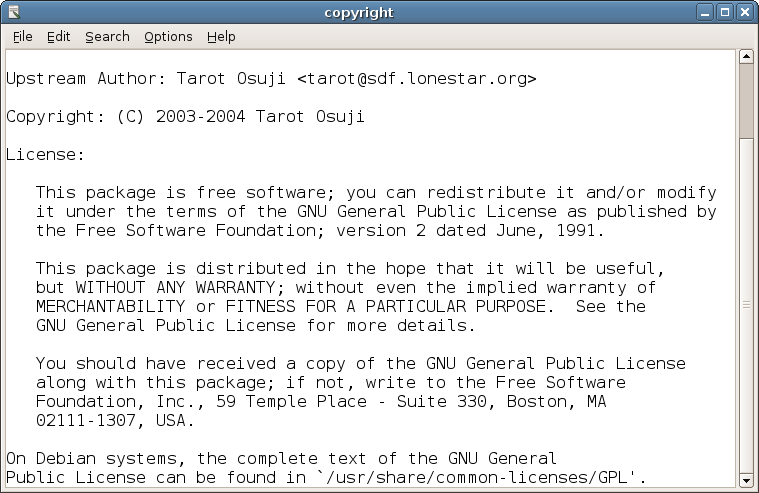|
GNU GLOBAL
GNU GLOBAL is a software tool for source code tagging to aid code comprehension. It works in a uniform fashion in various environments (GNU Emacs, Vim, GNU less, GNU Bash, web browsers, etc.), allowing users to find all objects declared in the source files and to move among them easily. It is particularly useful for working on projects containing numerous sub-projects and complex syntax trees generated by the compilation process (e.g., C code containing numerous #ifdef directive which select among several ''main()'' functions using conditional compilation). It is similar to older tagging software such as ctags and etags, but differs in its independence from any specific text editor. GNU GLOBAL is free software maintained for the GNU project by Shigio Yamaguchi. Use cases Use cases are varied, and include traversing the source code of the Linux kernel, [...More Info...] [...Related Items...] OR: [Wikipedia] [Google] [Baidu] |
Linux Kernel
The Linux kernel is a free and open-source, monolithic, modular, multitasking, Unix-like operating system kernel. It was originally authored in 1991 by Linus Torvalds for his i386-based PC, and it was soon adopted as the kernel for the GNU operating system, which was written to be a free (libre) replacement for Unix. Linux is provided under the GNU General Public License version 2 only, but it contains files under other compatible licenses. Since the late 1990s, it has been included as part of a large number of operating system distributions, many of which are commonly also called Linux. Linux is deployed on a wide variety of computing systems, such as embedded devices, mobile devices (including its use in the Android operating system), personal computers, servers, mainframes, and supercomputers. It can be tailored for specific architectures and for several usage scenarios using a family of simple commands (that is, without the need of manually editing its source c ... [...More Info...] [...Related Items...] OR: [Wikipedia] [Google] [Baidu] |
Text Editor
A text editor is a type of computer program that edits plain text. Such programs are sometimes known as "notepad" software (e.g. Windows Notepad). Text editors are provided with operating systems and software development packages, and can be used to change files such as configuration files, documentation files and programming language source code. Plain text and rich text There are important differences between plain text (created and edited by text editors) and rich text (such as that created by word processors or desktop publishing software). Plain text exclusively consists of character representation. Each character is represented by a fixed-length sequence of one, two, or four bytes, or as a variable-length sequence of one to four bytes, in accordance to specific character encoding conventions, such as ASCII, ISO/IEC 2022, Shift JIS, UTF-8, or UTF-16. These conventions define many printable characters, but also non-printing characters that control the flow of ... [...More Info...] [...Related Items...] OR: [Wikipedia] [Google] [Baidu] |
Free Computer Programming Tools
Free may refer to: Concept * Freedom, having the ability to do something, without having to obey anyone/anything * Freethought, a position that beliefs should be formed only on the basis of logic, reason, and empiricism * Emancipate, to procure political rights, as for a disenfranchised group * Free will, control exercised by rational agents over their actions and decisions * Free of charge, also known as gratis. See Gratis vs libre. Computing * Free (programming), a function that releases dynamically allocated memory for reuse * Free format, a file format which can be used without restrictions * Free software, software usable and distributable with few restrictions and no payment * Freeware, a broader class of software available at no cost Mathematics * Free object ** Free abelian group ** Free algebra ** Free group ** Free module ** Free semigroup * Free variable People * Free (surname) * Free (rapper) (born 1968), or Free Marie, American rapper and media per ... [...More Info...] [...Related Items...] OR: [Wikipedia] [Google] [Baidu] |
Code Navigation Tools
In communications and information processing, code is a system of rules to convert information—such as a letter, word, sound, image, or gesture—into another form, sometimes shortened or secret, for communication through a communication channel or storage in a storage medium. An early example is an invention of language, which enabled a person, through speech, to communicate what they thought, saw, heard, or felt to others. But speech limits the range of communication to the distance a voice can carry and limits the audience to those present when the speech is uttered. The invention of writing, which converted spoken language into visual symbols, extended the range of communication across space and time. The process of encoding converts information from a source into symbols for communication or storage. Decoding is the reverse process, converting code symbols back into a form that the recipient understands, such as English or/and Spanish. One reason for coding is to enab ... [...More Info...] [...Related Items...] OR: [Wikipedia] [Google] [Baidu] |
GNU Savannah
GNU Savannah is a project of the Free Software Foundation initiated by Loïc Dachary, which serves as a collaborative software development management system for free Software projects. Savannah currently offers CVS, GNU arch, Subversion, Git, Mercurial, Bazaar, mailing list, web hosting, file hosting, and bug tracking services. Savannah initially ran on the same SourceForge software that at the time was used to run the SourceForge portal. Savannah's website is split into two domain names: savannah.gnu.org for software that is officially part of the GNU Project, and savannah.nongnu.org for all other software. Unlike SourceForge or GitHub, Savannah's focus is for hosting free software projects and has very strict hosting policies, including a ban against the use of non-free formats (such as Adobe Flash) to ensure that only free software is hosted. When registering a project, project submitters have to state which free software license the project uses. Project owners do not h ... [...More Info...] [...Related Items...] OR: [Wikipedia] [Google] [Baidu] |
Free Software Directory
The Free Software Directory (FSD) is a project of the Free Software Foundation (FSF). It catalogs free software that runs under free operating systems—particularly GNU and Linux. The cataloged projects are often able to run in several other operating systems. The project was formerly co-run by UNESCO. Unlike some other directories that focus on free software, Free Software Directory staff verify the licenses of software listed in the directory. Coverage growth and usages FSD has been used as a source for assessing the share of free software, for example finding in September 2002 an amount of "1550 entries, of which 1363 (87.9%) used the GPL license, 103 (6.6%) used the LGPL license, 32 (2.0%) used a BSD or BSD-like license, 29 (1.9%) used the Artistic license, 5 (0.3%) used the MIT license". By September 2009, the Directory listed 6,000 packages whose number grew up to 6,500 in October 2011, when the newly updated directory was launched. All listed packages are "free for any comp ... [...More Info...] [...Related Items...] OR: [Wikipedia] [Google] [Baidu] |
Debug Symbol
A debug symbol is a special kind of symbol that attaches additional information to the symbol table of an object file, such as a shared library or an executable. This information allows a symbolic debugger to gain access to information from the source code of the binary, such as the names of identifiers, including variables and routines. The symbolic information may be compiled together with the module's binary file, or distributed in a separate file, or simply discarded during the compilation and/or linking. This information can be helpful while trying to investigate and fix a crashing application or any other fault. Embedded symbols Debug symbols typically include not only the name of a function or global variable, but also the name of the source code file in which the symbol occurs, as well as the line number at which it is defined. Other information includes the type of the symbol (integer, float, function, exception, etc.), the scope ( block scope or global scope), t ... [...More Info...] [...Related Items...] OR: [Wikipedia] [Google] [Baidu] |
GNU Automake
In software development, GNU Automake is a programming tool to automate parts of the compilation process. It eases usual compilation problems. For example, it points to needed dependencies. It automatically generates one or more ''Makefile.in'' from files called ''Makefile.am''. Each ''Makefile.am'' contains, among other things, useful variable definitions for the compiled software, such as compiler and linker flags, dependencies and their versions, etc. The generated "''Makefile.in''"s are portable and compliant with the Makefile conventions in the GNU Coding Standards, and may be used by configure scripts to generate a working Makefile. The Free Software Foundation maintains as one of the GNU programs, and as part of the GNU build system. It is used to build several GNU applications and libraries, such as GTK, as well as non-GNU software such as XCircuit. Process Automake aims to allow the programmer to write a makefile in a higher-level language, rather than havi ... [...More Info...] [...Related Items...] OR: [Wikipedia] [Google] [Baidu] |
HTML
The HyperText Markup Language or HTML is the standard markup language for documents designed to be displayed in a web browser. It can be assisted by technologies such as Cascading Style Sheets (CSS) and scripting languages such as JavaScript. Web browsers receive HTML documents from a web server or from local storage and render the documents into multimedia web pages. HTML describes the structure of a web page semantically and originally included cues for the appearance of the document. HTML elements are the building blocks of HTML pages. With HTML constructs, images and other objects such as interactive forms may be embedded into the rendered page. HTML provides a means to create structured documents by denoting structural semantics for text such as headings, paragraphs, lists, links, quotes, and other items. HTML elements are delineated by ''tags'', written using angle brackets. Tags such as and directly introduce content into the page. Other tags such as sur ... [...More Info...] [...Related Items...] OR: [Wikipedia] [Google] [Baidu] |
Package (package Management System)
A package manager or package-management system is a collection of software tools that automates the process of installing, upgrading, configuring, and removing computer programs for a computer in a consistent manner. A package manager deals with ''packages'', distributions of software and data in archive files. Packages contain metadata, such as the software's name, description of its purpose, version number, vendor, checksum (preferably a cryptographic hash function), and a list of dependencies necessary for the software to run properly. Upon installation, metadata is stored in a local package database. Package managers typically maintain a database of software dependencies and version information to prevent software mismatches and missing prerequisites. They work closely with software repositories, binary repository managers, and app stores. Package managers are designed to eliminate the need for manual installs and updates. This can be particularly useful for large ent ... [...More Info...] [...Related Items...] OR: [Wikipedia] [Google] [Baidu] |



